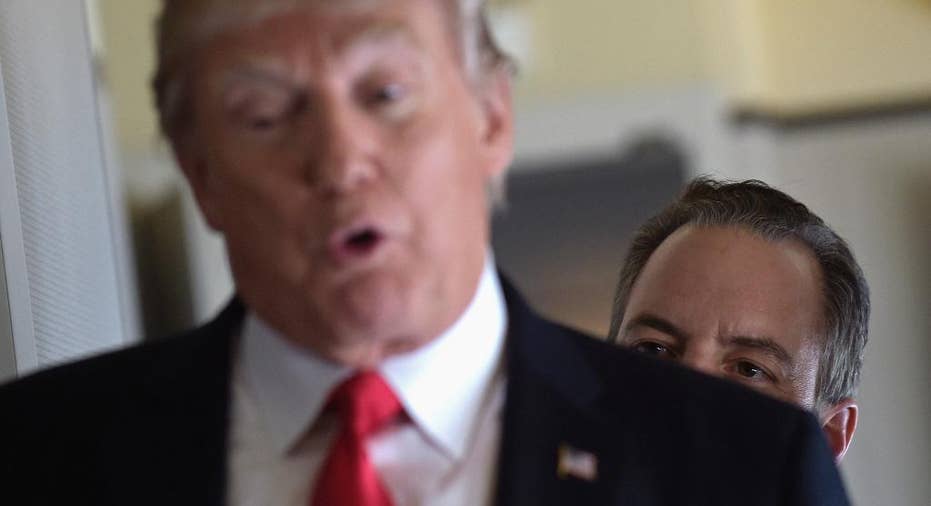Trump on jobs report: 'It's going to continue, big league'

WASHINGTON – President Donald Trump greeted news of a robust January jobs report Friday with his signature blend of gusto, self-promotion and promises of good times yet to come.
"Great spirit in the country right now," Trump said of the 227,000 jobs gained last month.
Flanked by leading CEOs who met with him at the White House, Trump suggested that his November election victory had lifted America's morale — and emboldened many employers to step up hiring. His celebratory response to a strong jobs report contrasted with the restraint typical of Barack Obama, who tended to mention the millions of Americans still searching for work in any given month.
"I think it's going to continue, big league," Trump said of last month's job growth.
The president has yet to wade far into the details of policies that could shape the economy under his watch and possibly into his successor's administration. So far, he has kept his economic proposals short of specifics while promoting their benefits.
Trump has argued that rising confidence among employers and investors in the past couple of months stems from the widespread belief that he can deliver lower taxes, fewer regulations and more good-paying jobs, even for people without a college degree or specialized training.
Few economists share the extent of his optimism. The U.S. unemployment rate — which during the campaign Trump branded a "hoax" — is already a low 4.8 percent. To most analysts, an unemployment rate that low means that so many people who want jobs already have them that eventually hiring will slow naturally — a trend that's usually beyond the direct influence of a president.
"It's inevitable that the pace of gains will slow because there's almost no one left to hire to put into new jobs," said Andrew Chamberlain, chief economist at the jobs site Glassdoor.com.
Trump hasn't enjoyed the smoothest of policy roll-outs in the two weeks since his inauguration. The result has been some uncertainty about the economy and about the likelihood that he can generate his promised surge in hiring. He has pledged to add 25 million jobs over 10 years, which translates into roughly 208,000 new jobs each month.
Some of his perceived missteps may eventually increase skepticism about other policies. His administration's spokesman, for example, highlighted a border tax to help U.S. manufacturing and to finance a wall along the Mexican border, only to quickly backpedal on the issue and say the tax was an option.
The president of Mexico canceled a planned visit to meet with Trump to discuss revisions to the North American Free Trade Agreement, though the two spoke by phone afterward.
Protests at airports followed the administration's suspensions of travel from seven Muslim-majority countries, prompting statements of concern from such tech giants as Amazon, Microsoft and Uber.
One of the challenges is that governance depends on specifics and clarity, something that has eluded Trump so far.
He signed an executive order Monday to streamline regulations by requiring that agencies that adopt a new rule must also eliminate two existing rules. The executive order as written could leave agencies hesitant to cut any rules and thereby make the bureaucracy less responsive.
"The order is extremely vague, and it could easily lead to agency gridlock and regulatory uncertainty," said Richard Revesz, director of the Institute for Policy Integrity at New York University's School of Law.
Trump's twists and turns on policy have created some anxiety that could spill over to later jobs reports. Many economists view the prospect of reducing the tax and regulatory burden along with more infrastructure spending — another Trump commitment — as helpful for growth. But they also see his strong-arm tactics on trade as worrisome.
"We remain highly concerned that the skirmishes with key trading partners and threats of border taxes will be self-defeating and ultimately growth inhibiting," said Douglas Porter, chief economist at BMO Financial Group.
There is also the possibility that Trump is still formulating and fine-tuning his policies for the economy, figuring out what will pack the biggest punch based on what he is told.
Still, small business owners who met with Trump on Monday said they felt that he heard their concerns about regulations and the costs of health insurance because of the health care law known as the Affordable Care Act. They said they saw him as empathetic and genuinely curious about their needs for growing their companies.
"He understands," said Jackie Krick, founder and president of the Virginia-based marketing firm ECU Communications. "He wasn't very specific about what he was going to do — it was a listening session, which I think was very good."



















